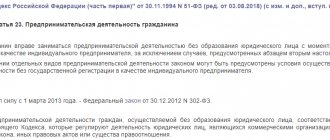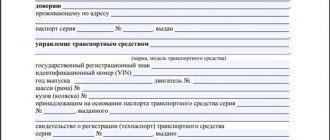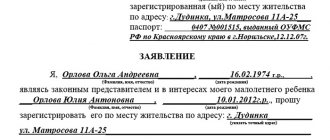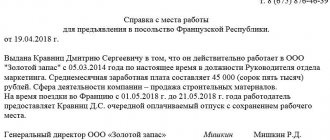When do you need a power of attorney for a child?
Some parents are concerned about the problem - is their permission required for a teenager to travel unaccompanied?
At what age can a minor travel unaccompanied by an adult?
The rules for traveling a child are regulated by Art. 20, Article 21, Article 22 of Law No. 114 Federal Law of the Russian Federation of August 15, 1996 “On the procedure for leaving the Russian Federation and entering the Russian Federation”, which provides the following basic provisions:
- A teenager does not have the right to move independently until the age of 12.
- Moving with teenagers under 12 years of age in the Russian Federation can be carried out with elders, subject to the mandatory consent of the father and mother.
- From the age of 12, a teenager has the right to move independently across the territory of the Russian Federation, without the presence of elders.
- A power of attorney for a baby under 2 years old may be required from two parents only when leaving the Russian Federation.
The departure of a teenager to another state is permitted only upon presentation of a power of attorney for the teenager, which is confirmed by a notary. In this case, a minor is considered to be a teenager under 18 years of age.
( Video : “Do I need to issue a power of attorney for a child”)
In what cases is a power of attorney needed?
If the child remains an orphan, guardianship is issued over him. But it happens that parents are busy with their careers and disappear for days at work or on business trips. Or maybe the family is incomplete, and the only parent unexpectedly ended up in the hospital. You never know how many situations may arise in which your grandmother’s help will be needed!
Of course, she will be able to solve ordinary everyday issues, but in some cases it is impossible to do without a power of attorney duly executed in her name.
The most common of them are:
- Situations related to healthcare facilities.
- Situations related to preschool and educational institutions.
- Administrative level situations.
The listed situations require increased attention from adults. Moreover, each case may require several decisions to be made at once.
As for situations in medical institutions, these include the following questions:
- give or refuse consent to the hospitalization of a minor;
- sign a waiver of surgical intervention;
- enter into an agreement to provide medical services to the child;
- contribute funds to pay for the treatment of a grandson or granddaughter;
- receive oral information about the baby’s health status from the attending physician or a written extract from his medical history.
The child's representative must have a power of attorney to receive information and carry out the actions described above.
Among the situations related to preschool and educational institutions, the following most often require permission:
- receive information from school teachers about the student’s progress;
- receive information from educators about the physical and psychological condition of the minor;
- pay for the maintenance of minors in preschool or education in an educational institution.
In order for the grandmother to help the baby and pick him up from kindergarten, permission from the parents is needed.
Administrative level situations include:
- traveling abroad with a child;
- traveling within the borders of the Russian Federation, due to the fact that the legislation of some regions does not allow minors to appear in public places unaccompanied by relatives or responsible persons;
- observance of the so-called “curfew”, after which minors under the age of seven have no right to appear on the street, and older children can only go out when accompanied by their parents and authorized representatives.
This is important to know: Is it possible to officially refuse child support after a court decision?
It should be noted that regional legislation may establish its own requirements.
For example, the government of the Krasnodar Territory adopted a law requiring parental consent for a citizen accompanying a minor on his way by rail.
In addition, a signal from teachers to the guardianship authority that the child is left to his own devices may provoke an inspection and threaten the family with serious troubles. An official document issued to the grandmother will confirm her authority in relation to the minor and justify the lack of parental care.
Power of attorney for a child when traveling abroad
Official permission from the father and mother for a teenager to leave the Russian Federation is required in two circumstances:
- Upon receipt of a visa at the embassy.
- When leaving the Russian Federation.
In the first circumstance, the power of attorney is issued in accordance with the law of the state where the teenager is sent.
In the second option, permission to leave is issued in accordance with the federal law of the Russian Federation.
To purchase permission for a teenager to leave the Russian Federation, you need to prepare a set package of documentation.
In addition to the prepared certificates, you will need to provide information about the duration of the trip and which countries you plan to visit.
If a child is traveling from the Russian Federation with his father or mother, then permission to leave is not required. If a teenager leaves the Russian Federation with other relatives or in a group, then in this case permission to leave from his father and mother will be required.
Adults often ask the question: Is it possible for only one parent to consent in this option?
Issuance of consent to departure signed by only one of the parents is carried out upon presentation of:
- Certificates that the child is being raised only by the mother.
- Certificates from the registry office confirming that the father in the baby’s documents is recorded from the mother’s words.
- Certificates (copies) of the death of father or mother.
- Copies of the court verdict on deprivation of parental rights.
- Certificates from the Ministry of Internal Affairs that the parent’s place of residence is unknown.
All copies of documents must be notarized.
If the father or mother filed a petition with the migration agency to object to the teenager’s departure from the country, the problem can only be resolved by the court.
If the mother or father went on a business trip or are far away for another reason, then this option allows the execution of two separate notarized consents to leave.
Across Russia
When traveling around the Russian Federation, there is no need to draw up a power of attorney for a teenager.
At the same time, having such a form can be useful. So, if it is available, neither train conductors, nor airplane and ship crew workers, nor the transport police will have questions about accompanying a child by an adult citizen. It should be noted that the permit is a purely formal document. After all, if a baby travels with his grandparents, then proving the relationship is very problematic, since there are no such records in the forms confirming the baby’s identity.
Therefore, when accompanying a child, it is advisable for a senior citizen to stock up on the following documents:
- Passport.
- Baby's birth certificate.
- A permit document from the father and mother to accompany the baby.
It should also be borne in mind that a teenager has the right to travel on trains after he turns 10 years old, and on planes or buses when he reaches 12 years old.
At the same time, we must take into account that there are cities where a kind of curfew has been established, limiting the presence of a teenager in public places without adults. If this circumstance is not observed, the teenager may be detained until his relatives arrive.
To summarize, we can note the following: despite the fact that when moving around the Russian Federation, a power of attorney for a teenager is not required, having one will not be superfluous.
Power of attorney to represent the interests of a minor child
Representation of the interests of a person under 18 years of age is possible by any person who has full legal capacity, including age. Practice shows that most powers of attorney are issued to relatives, for example, grandparents, as well as teachers.
According to the law, a number of cases require a notarized version. An example would be taking a child abroad. In such a situation, there must be a document that is properly executed and must be notarized.
- It is prohibited to send a child under 10 years of age on long-distance trains without any accompaniment;
- may ask the child who he is traveling with. This question can be asked by law enforcement officers, a hotel manager, a conductor, etc.;
- To register a young child at a hotel, you will need not only his birth certificate, but also the passport of the accompanying person;
- Formally, children over ten years old are allowed to travel without parents on railway transport, and from 12 years old - on intercity buses and planes.
We recommend reading: State duty on registration certificate for an apartment
The legislation of the Russian Federation allows one parent to issue a power of attorney. Based on this document, the child can travel abroad accompanied by a third party. But we should not forget that there are a number of states, including those that belong to the Schengen zone, that accept minors only if there is a power of attorney from both parents. If one of them previously submitted his disagreement to leave in writing, it may be possible to cancel it through legal proceedings.
Unfortunately, schools and kindergartens now do not always accept such a document. In such a situation, lawyers advise writing a power of attorney to represent the interests of the parent. It should describe the range of issues that the elected representative will have the right to resolve, including those related to the child. The power of attorney will be drawn up to represent the interests of the parent, and not his children, and therefore must satisfy the requirements of the authorized bodies.
Traveling abroad with a minor is permissible only if accompanied by parents (guardians) or with a power of attorney. In addition to general information (information about the notary, grandmother, baby, his mother and father, or representatives appointed by the PLO), the document should indicate the period of stay outside the territory of the Russian Federation and the place of destination. The rights and obligations of the relative accompanying the child and the validity period of the power of attorney are described below. At the end of the document, the parents, notary and grandmother put their signatures.
Can one of the parents draw up a power of attorney for a child?
As a rule, consent to travel with a teenager is signed by both parents.
However, situations are possible when, for some reason, one of them is absent (for example, a business trip or other reason). The question arises: will a document signed by one parent receive valid status? Legislative provisions allow the issuance of such a certificate. A grandmother and a child can leave the Russian Federation with the permission of only the father and mother, but to travel with a teenager within the territory of the Russian Federation, the signature of only one of the parents is allowed. In this option, you only need to follow the general rules for drawing up a power of attorney:
- The names and passport details of the father and mother, as well as the citizen with whom the teenager will travel, must be recorded.
- The full name of the baby, the day of his birth and all the details from the document confirming his identity (passport, if he is 14 years old, or birth certificate) must be written down.
- The powers of the trustee must be specified.
- It is required to note the date of acquisition of the power of attorney and the duration of its validity, although the period may not be specified.
- Notarized confirmation of such a form is mandatory when moving across the Russian Federation. When leaving the Russian Federation, such consent must be certified by a notary.
Conditions and design features
Only his parents or other legal representatives can trust a grandmother to represent the interests of a grandson or granddaughter.
The type of parental consent provided and the amount of information provided depends on the situation in connection with which it is issued.
Federal Law No. 323-FZ dated November 21, 2011 “On the fundamentals of protecting the health of citizens in the Russian Federation” established the procedure for providing medical care to minors. Children under 15 years of age must be accompanied by an adult with legal capacity who has a special or one-time power of attorney to represent the interests of the child in a medical institution from his parents.
Regardless of whether the minor is undergoing inpatient or outpatient treatment, the document has a similar spelling and may differ only in the set of powers assigned to the trustee.
Parents can delegate to the grandmother any rights in the field of protecting the health of their beloved child:
- making decisions about vaccinations;
- consent to hospitalization and surgery;
- presence at procedures and medical procedures and others.
The instructions of the principals must be lawful and unambiguous. Since the main task of both parties is to protect the health and life of the child, it would be useful to indicate in the document any contraindications associated with allergies or other diseases.
Attention! The more specific and relevant the information specified in the power of attorney is, the fewer problems the medical institution will encounter, and the medical care it provides will be the most efficient and qualified.
This is important to know: Privatization of an apartment with minor children
When drawing up this type of document, it is worth specifying in detail all permitted actions.
Is it possible to write a power of attorney for a child by hand, sample
The law does not regulate the mandatory drawing up of a power of attorney using technical means. The main thing is that the document is filled with legible text and does not contain gross legal errors. These errors include:
- Incorrect filling of the name (or title, when drawing up a document by an institution) of the principal and accompanying citizen.
- Lack of information identifying the accompanying person.
- Lack of signature of the principal (unsigned permission is invalid).
- No completion date.
A manually completed power of attorney must display:
- Details of mother and father and trusted citizen.
- Displays the powers vested in the authorized person.
- Date of completion.
- Signatures of the father and mother and the person who will travel with the baby, or a seal if the document was issued by an institution.
What documents are required to create a power of attorney?
If permission to leave the Russian Federation is issued, confirmation of signatures by a notary is required. To do this, you need to prepare the following documentation:
- Svid. birth certificate or passport, when the boy is 14 years old.
- Passports of mother and father.
- Passport of a citizen traveling with a teenager.
- Certificates confirming the legality of the mother’s or father’s consent.
- Document on marriage or divorce.
- A court ruling allowing a teenager to leave the Russian Federation if one parent disagrees.
When passing through customs and passport control you will need to present:
- International passport for a teenager.
- Civil passport or birth certificate.
- Availability of a visa.
- Medical insurance
- Permission approved by a notary.
- Reason for departure: voucher, medical. testimony, etc.
In some cases, a citizen traveling with a teenager may be asked to provide additional certificates to clarify his status. For example, if a teenager goes abroad with a coach, the latter must provide documents certifying this fact.
( Video : “How to properly issue a power of attorney”)
Contents of the power of attorney
When drawing up a power of attorney, it should be taken into account that it may consist of:
- Mandatory points that cannot be missed.
- Additional information that is entered at the request of the parties.
The form must include the following information:
- Principal details. If there are two parents, the paper is written on behalf of both, since the permission of only the father or mother does not give the full range of authority - full name, passport details, residential address.
- Information about the authorized person – full name, passport details, registration or residence address.
- Information about the person under guardianship – full name, number and date of issue of the identification document. For children under 14 years of age, this is a birth certificate, and for adolescents over this age, a passport.
- Indication of the degree of relationship with the authorized person.
- Grounds for transfer of powers.
- Clarification of the powers vested in a related person in relation to a minor.
- Signatures of the parties.
- Certification signature of a notary, sealed.
Authority
The power of attorney must clearly state the powers vested in the grandmother. It is recommended to indicate without fail that the trustee has the following responsibilities:
- To protect the rights and interests of a minor.
- Be fully responsible for the life and health of the child.
- If necessary, make decisions about the need for medical hospitalization, including surgical intervention.
This set of credentials is considered standard for traveling with non-parents.
If a power of attorney is issued for other purposes, for example, representation of parents in educational institutions, then the following points can be additionally specified:
- Conducting negotiations and making decisions on them.
- Possibility of submitting documents and obtaining certificates for the child.
- Performing actions related to the execution of the described order.
Lawyers recommend specifying a fairly detailed list of powers. If a power of attorney is issued to carry out certain assignments in a specific locality and does not imply travel abroad, then this should be indicated.
This is important to know: Benefits for guardians of orphans: amount and payment of benefits to guardians of minor children in 2021
Do I need to contact a notary?
As noted earlier, a power of attorney must be certified by a notary if a teenager goes abroad. To obtain such a form from a notary you will need:
- The presence of father and mother.
- Passports of parents and authorized persons.
- Child's birth certificate.
- Marriage certificate.
- Information about the teenager’s travel destination with a trusted person.
- Indicate the duration of the trip.
You will have to pay a certain amount to obtain such a form from a notary.
Note. You can obtain a power of attorney from a notary on a strict reporting form, with a unique number assigned to the form. The form is signed by the applicants, as well as the notary, with his signature supported by a seal.










